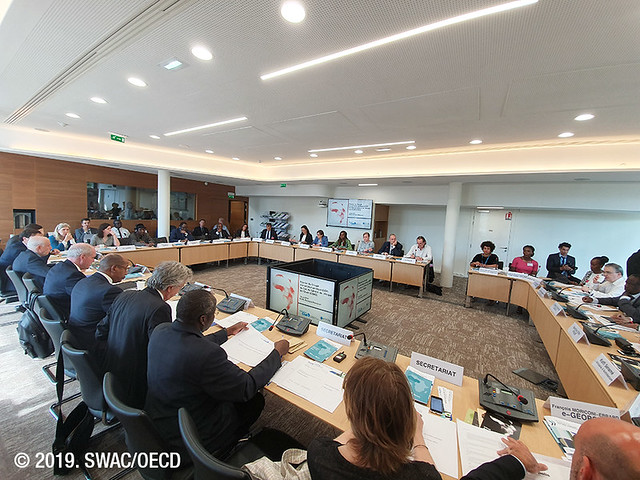African Cities: New Development Interfaces
| Strategy and Policy Group (SPG) meeting OECD Conference Centre, Boulogne-Billancourt, 19 June 2019 |
||
|
The annual meeting of the SWAC Strategy and Policy Group (SPG) kicked-off with a preview of the 2019 Africapolis report and a roundtable discussion on the challenges and opportunities of building Africa’s urban future.
Understanding African urban realities Between now and 2050, Africa is projected to experience the fastest urban growth in the world. On the African continent, there are currently 222 large cities and over 7 400 urban areas with 10 000 to 300 000 inhabitants representing 97% of the urban fabric. These small- and medium-sized agglomerations, previously unaccounted for in international databases until the creation of Africapolis.org, are home to 260 million people, i.e. 45% of the total urban population. In addition to capitals and other large cities, it is important to take such areas into consideration as part of a sustainable and inclusive approach to development.
But adequate and adapted policies and investments to meet this rapid urban expansion are rare. Better living conditions, inclusive and sustainable economic transformation, African integration, empowerment of women and young people, peaceful societies and good governance are the prime considerations for an increasingly urbanised continent. Better cities – properly connected to their territories and ecosystems – will contribute to the realisation of pan-African aspirations (Agenda 2063) for transformation and global agendas for sustainable development (2030 Agenda).
One of the major findings of the 2019 Africapolis report is that rapid population growth is increasingly blurring the lines between urban and non-urban areas. It also points out that:
This work led to the development of an Africapolis Niger country note that featured in the “smart village” pavilion of the “Innovation for Development” forum that took place on 9-10 July 2019, on the sidelines of the Conference of Heads of State and Government of the African Union in Niamey, Niger.
|

|
|
|
The Sahel and West Africa Club SPG annual meeting During the Strategy and Policy Group sessions, Members and partners reflected on the progress and outputs achieved by SWAC in 2018 (see Annual Report 2018) and discussed ongoing priorities in its programme of work. Among others, they reviewed activities related to: food issues, including the latest updates from the Food Crisis Prevention Network (RPCA); cities and urbanisation, such as Africapolis, the role played by border cities for regional integration and the elaboration of an e-toolkit focussing on the resilience of border cities to climate change; gender, in particular the use of relational analysis to describe the role that social capital and networks play for women traders; and security in the region, with sustained political advocacy efforts. Members and partners also welcomed the creation of a Women and Youth Working Group (“Sahelles”) to fully mainstream gender and age perspectives into the work of SWAC. To that effect, the women and youth representatives for 2019, respectively Dr. Leena Hoffmann (Chatham House Africa Programme) and Halimatou Hima (PhD candidate, University of Cambridge), were invited to participate in the SPG. Looking forward, H.E. Diene Keita, Guinean Minister of Co-operation and African Integration, officially welcomed the next Sahel and West Africa Week, which will take place in Conakry from 2 to 7 December 2019.
|
||
Africapolis presentation:
Annual report:
Related Documents


